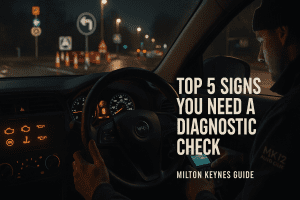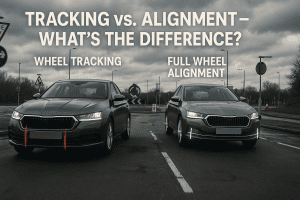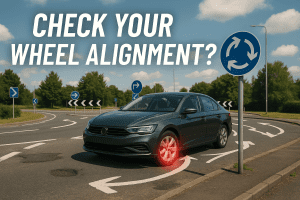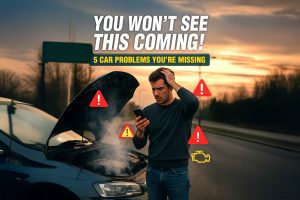You Don’t Want This to Happen to You
Last Tuesday, Sarah from Wolverton sat in our waiting area looking absolutely fed up. Her Honda Jazz had just failed its MOT because of a seized brake caliper. “I knew something wasn’t right,” she told me, “but I kept putting off getting it checked. Now I’m stuck without a car for three days.”
This happens more often than you’d think. People notice their brakes aren’t quite right, but life gets busy. Before they know it, MOT time rolls around and what could have been a simple fix becomes a proper headache.
If your MOT is coming up and you’re wondering about your brakes, this one’s for you. I’m going to show you exactly what to look out for, so you don’t end up like Sarah.
Why Brakes Fail MOTs So Often
Here’s something that might surprise you brake problems are one of the top three reasons cars fail their MOT. According to the latest DVSA MOT testing statistics, braking system defects consistently account for around 10% of all MOT failures across Great Britain.
Now, you might think this is just because people don’t look after their cars properly. But honestly, after fifteen years fixing cars in Milton Keynes, I reckon it’s more complicated than that.
Think about how you drive around here. We’ve got more roundabouts than you can shake a stick at. Every journey involves constant stopping and starting – whether you’re navigating the grid roads during rush hour or queuing to get onto the A5. Your brakes are working overtime compared to cars that spend most of their time on dual carriageways.
Then there’s our lovely British weather. One day it’s dry, the next it’s chucking it down. Winter brings road salt that gets into everything, and spring brings that gritty mess that seems to coat every surface. All of this takes its toll on brake components in ways that many drivers don’t realize.
The thing is, brakes don’t usually just suddenly fail. They give you plenty of warning if you know what to listen and feel for. As the RAC points out in their brake safety guidance, most brake issues develop gradually over time, which means most of the MOT failures I see could have been caught weeks or even months earlier.
The Warning Signs You Can’t Ignore
Right, let’s get practical. These are the signs that your brakes need attention, and ignoring any of them is asking for trouble.
Strange Noises When You Brake
If your brakes are squealing like a wounded animal, that’s your brake pads telling you they’re getting thin. It’s actually designed to happen – there’s a little metal tab that starts scraping against the disc when the pad material gets low.
But if you’re hearing grinding or scraping sounds, that’s much worse. That means you’ve worn through the pad completely and metal is grinding on metal. Not only will this fail your MOT, but you’re damaging the brake discs too, which turns a £60 job into a £200+ job.
Your Brake Pedal Feels Different
Your brake pedal should feel firm and consistent. If it’s suddenly gone soft and spongy, or if you have to press it further down than usual, something’s wrong with the hydraulic system. This could be anything from air in the brake lines to worn brake fluid, but either way, it needs sorting immediately.
The Car Shakes When You Brake
If your steering wheel vibrates or judders when you brake, you’ve probably got warped brake discs. This happens when discs get too hot (usually from heavy braking) and warp slightly. It affects how well your car stops and will definitely fail the MOT’s brake efficiency test.
Warning Lights on Your Dashboard
Modern cars are pretty clever. If your brake warning light comes on, the car is trying to tell you something important. Don’t ignore it and hope it goes away it won’t.
The Car Pulls to One Side
When you brake, your car should stop in a straight line. If it’s pulling left or right, you’ve got uneven braking – maybe a seized caliper or significantly different pad wear on each side. This is dangerous and an automatic MOT failure.
It Takes Longer to Stop
This is the scariest one because it happens gradually. If you’ve noticed your stopping distances getting longer, don’t wait. This is your brakes telling you they’re not working properly anymore.
Any of these symptoms mean you need to get your brakes checked properly. At MK12 Autocare, we see all of these regularly, and catching them early always saves money and keeps you safe.
We’ve written a detailed guide about the most common MOT failures in Milton Keynes and how to avoid them – it’s worth a read if your MOT is coming up.
A Story That’ll Make You Think
A few weeks back, Tony from Bletchley brought his old Vauxhall Astra in. He’d been hearing a slight squeaking sound for about a month but wasn’t sure if it was worth worrying about. “It only does it sometimes,” he said, “and the car still stops fine.”
When we got it up on the ramp, we found the brake pads on the driver’s side were nearly down to the metal, while the passenger side still had loads of life left. This is actually quite common around here because of all our roundabouts – you’re constantly turning left, which puts different stresses on each wheel.
If Tony had left it another week or two, those pads would have been completely gone. The metal backing would have started scoring the brake disc, turning what was going to be an £80 brake pad job into needing new discs as well – probably around £280.
More importantly, his MOT was due the following month. Those worn pads would have failed the test for sure, meaning a retest fee on top of the emergency repair costs.
Instead, we sorted the pads there and then. Tony’s car passed its MOT with flying colors, and he told me later that the peace of mind was worth every penny. He knew his car was safe for his family, and he didn’t have any nasty surprises when MOT time came around.
Why Milton Keynes is Particularly Hard on Brakes
I’ve been working on cars in Milton Keynes since 2008, and I can tell you that our city is uniquely tough on braking systems. It’s not just the roundabouts, though they’re a big part of it.
Think about your typical journey. Whether you’re heading from Bletchley into Central Milton Keynes, or from Wolverton down to Newport Pagnell, you’re constantly slowing down for roundabouts, stopping at traffic lights, and dealing with stop-start traffic. Your brakes barely get a chance to cool down, especially during rush hour.
The grid road system doesn’t help either. Unlike traditional towns where you might have long straight roads between stops, Milton Keynes keeps you braking and accelerating in a pattern that’s particularly hard on brake components.
Then there’s the weather factor. Our winters mean road salt, which is brilliant for keeping us safe but terrible for brake components. It gets into everything and accelerates corrosion, particularly of brake lines and calipers. Come spring, you’ve got this mixture of rain and leftover grit that’s like sandpaper on your brake discs.
This is why we at MK12 Autocare have developed such a good understanding of what Milton Keynes does to cars. We see the same patterns of wear year after year, and we know exactly what to look for during pre-MOT checks. It’s not the same as what you’d see in rural areas or even other cities Milton Keynes has its own particular challenges.
Don’t Risk It Get Checked
Look, I get it. Nobody wants unexpected car expenses, and it’s tempting to hope that funny noise will just go away. But when it comes to brakes, hoping isn’t a strategy.
If your MOT is coming up and you’ve noticed any of the warning signs I’ve mentioned, give us a call at MK12 Autocare. We can usually fit you in the same day, and a quick brake check is much cheaper than dealing with an MOT failure and emergency repairs.
We’re based in Kiln Farm, and we understand exactly what Milton Keynes driving does to cars. Whether you need a full MOT or just want peace of mind about your brakes, we’re here to help.
Don’t be like Sarah from Wolverton, stuck without a car because she put off getting things checked. A quick call now could save you days of hassle later.






